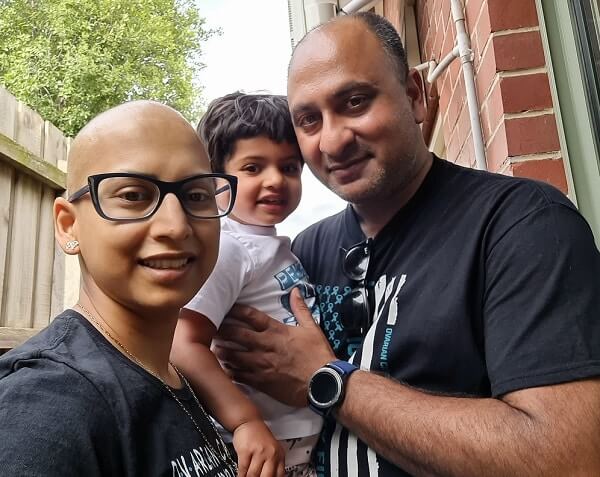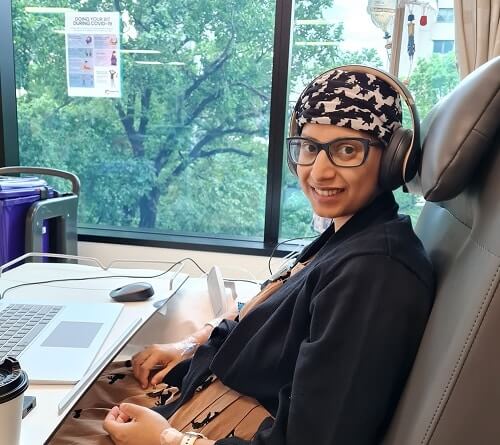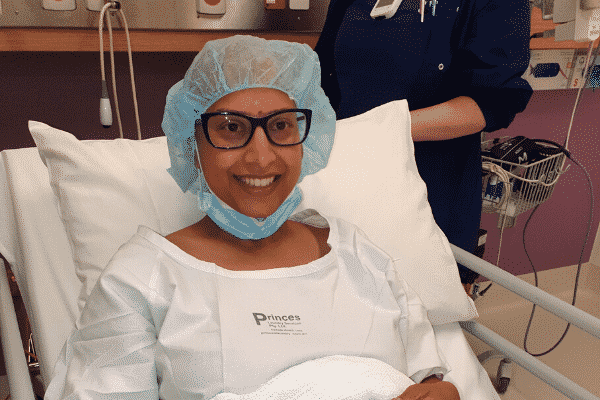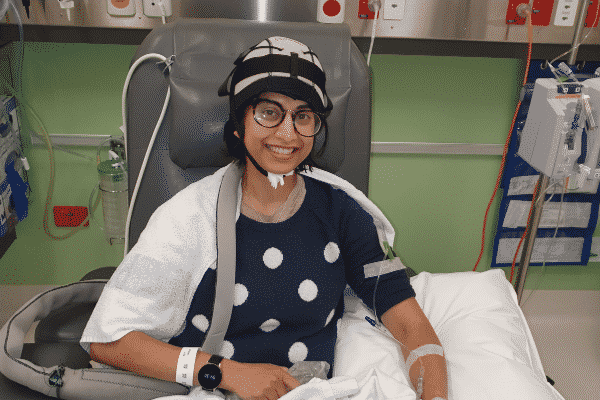In a matter of four weeks, the fundraising campaign that Srividya and her husband Ravi created to pay for her ovarian cancer treatment emerged super successful. Their goal was to raise $200,000 for Srividya’s maintenance therapy and in just a month, with the help of family, friends and well-wishers, they surpassed their goal.
In January last year, Dr Srividya Iyer moved cities to pursue a postgraduate degree in dentistry at Melbourne University. At the peak of Melbourne’s second COVID outbreak in August, she was placed at the Peter MacCallum Cancer Institute.
While working one day, Srividya began experiencing unusual bloating. Soon she went from a size 8 to a size 12 in just one week. A build-up of groin pain forced Srividya to check into the hospital emergency department where she waited for a diagnosis.
“I’d never thought that I would hear that C word really. Because I have medical literacy, I could ask what tests were required. I told them they would have to do a CT scan for a conclusive diagnosis. After the results came in, a 13-cm tumour was found on my right ovary, and it had already spread into my abdomen,” Srividya told Indian Link. “That’s when it really hit big time that it was ovarian cancer.”
Srividya was by herself when she received her diagnosis of stage-3 advanced ovarian cancer, Ravi and their 3-year-old daughter Raima remained home because extensive COVID restrictions wouldn’t allow them to accompany her into hospital.

Regular health check-ups and having bloodwork in order was something Srividya followed religiously. Yet none of it showed any indication of cancer until the disease had progressed significantly.
“When you hear such bad news, given I’ve never had any health issues, I really don’t think I can quantify what the emotional and the psychological impact of it was,” she said.
Straightaway, Srividya was moved to The Royal Women’s Hospital where six and a half litres of fluid needed to be drained from her abdomen just to keep her comfortable. Srividya could not walk 10 meters without huffing and puffing, it was pretty much like “being seven months pregnant”.
“It was one of the hardest things, worse than childbirth,” she remarked.
“You hear the word ‘cancer’ and you never associate it with your immediate family. It’s always someone else you hear about,” Ravi said. “Just that shock and adjusting to hearing that news which took a little while to digest, but I think in that sense, both of us are quite practical people. So, we were able to process it. Since then, the emotional support from all our family and extended family and friends has obviously been very big for both of us.”
About 60%-70% of ovarian cancer diagnoses only happen at stage three. It is called the deadliest gynaecological cancer because it has no early detection test, moreover, its vague symptoms make it harder to diagnose.
Symptoms like frequent urination and back pain could be easily ignored, even bloating is something very common during periods. Srividya’s menstruation cycle was so regular that she didn’t have reason to suspect anything was out of the ordinary.
Nevertheless, Srividya truly emerges as an iron woman.
Throughout her cancer treatment, she continued working at her job specializing in special needs dentistry where she looked after a clientele of patients with intellectual disabilities and those classified as medically complex.
“Working at the Cancer Institute gave me a broad outlook. Whenever I met someone young battling cancer and unable to cope, I would tell them my story and how important mental strength is,” she told Indian Link.
Srividya also finished the first year of her master’s degree with flying colours. She managed to complete all her clinics and sat her exams before her major surgery.

In oncology, a tumour marker is usually used to depict how active someone’s cancer is. Below the 35 mark is considered normal. Srividya’s tumour marker on the day of her diagnosis was 6700.
But due to the aggressive nature of her cancer, Srividya responded well to chemotherapy treatment. After the first cycle of her chemotherapy, her tumour marker dropped to 3000.
“After the third cycle, I got a CT scan and was told that I have shown a very good response and that my tumour had shrunk enough for them to comfortably operate and get everything out,” she stated.
On 13 November, two surgeons performed a six-hour surgery and extracted all the cancer from Srividya’s body. She lost a lot of blood.
“It was one of the scariest days of my life,” she revealed. “After that the last three cycles of chemo were basically like vacuuming, getting rid of any microscopic evidence of the disease. My tumour markers by the fifth cycle came down to 31, and around cycle six it came down to 21.”
Just when it seemed like the worst was over, Srividya was informed that the maintenance therapy required to keep her cancer from returning would not be covered by Australia’s Pharmaceutical Benefits Scheme (PBS).
“While I was in a good position, I was hit with another big setback where I was told because I don’t have the BRCA mutation my treatment options would be limited.”

Only cancer patients with BRCA mutations (about 15%) qualify for medication subsidised by the government. This meant that Srividya’s maintenance therapy would cost about $7,000-$7,5000 a month instead of $40 a month.
“Now you see, the majority doesn’t have it [BRCA mutation]. Even in terms of trials in Australia, only females with the mutation have been included. The government even said the medication works better for those with the mutation,” Srividya said. “Countries like USA and UK have been on the forefront where regardless of your mutation, you’re put on maintenance therapy. Many studies there have shown that it actually gives BRCA-negative females also a chance of longer progression-free survival periods or potentially a cure as well.”
Her husband considered selling their home in Perth to pay for the treatment, but the thought of it broke Srividya’s heart; it was where they had begun their journey and where their daughter was born.
It was Srividya’s oncologist who suggested they start a fundraising campaign through the non-profit Rare Cancers Australia.
It was also a way for the family to put pressure on the government and other parties while also raising awareness about the harrowing factors surrounding ovarian cancer.
“Anyone who goes through cancer should be given that opportunity to live and to explore the option of any maintenance drug which can keep their cancer at bay. Females like me also need a chance to live. We should not be doing all of this,” Srividya remarked.
Link up with us!
Indian Link News website: Save our website as a bookmark
Indian Link E-Newsletter: Subscribe to our weekly e-newsletter
Indian Link Newspaper: Click here to read our e-paper
Indian Link app: Download our app from Apple’s App Store or Google Play and subscribe to the alerts
Facebook: facebook.com/IndianLinkAustralia
Twitter: @indian_link
Instagram: @indianlink
LinkedIn: linkedin.com/IndianLinkMediaGroup





